Introduction
Do Ferrets Eat Mice: The dietary habits of ferrets have long piqued the curiosity of ferrets pets owners and animal enthusiasts alike. These playful and curious creatures are known for their carnivorous nature, and while mice might seem like a tempting snack for them, the answer to this question is more nuanced than it appears. In this exploration of ferret dietary preferences, we will delve into the natural instincts and nutritional needs of ferrets to better understand whether or not they commonly consume mice as part of their diet. Whether you’re a ferret owner seeking insights into their dietary habits or simply intrigued by the behavior of these fascinating pets, this discussion will shed light on the intriguing relationship between ferrets and mice in the realm of carnivorous appetites. Ferrets, often referred to as “obligate carnivores,” share a biological ancestry with the European polecat.
These ancestors primarily subsisted on a diet of small mammals, birds, and insects. Consequently, ferrets have inherited a strong carnivorous instinct, making meat the cornerstone of their nutritional requirements. When it comes to mice, the relationship between ferrets and these small rodents can be complex. While ferrets are natural predators and capable hunters, their domestication over centuries has somewhat tempered their predatory instincts. Many pet ferrets today are provided with balanced commercial diets specifically formulated to meet their nutritional needs, reducing the necessity for hunting and foraging. However, some ferrets may still exhibit their hunting instincts when presented with the opportunity to catch a mouse. The urge to stalk, pounce, and engage with small, moving prey remains ingrained in their behavior.
It’s not uncommon for ferrets to chase and capture mice if they encounter them in their environment, but this behavior is often driven more by their playfulness and curiosity than by a genuine dietary need. One essential aspect to consider when discussing ferret diets is the importance of providing a balanced and nutritionally complete diet for these pets. Commercial ferret food is specifically formulated to meet their dietary needs, which include high levels of animal-based protein and fat. This type of diet helps ensure that ferrets receive the essential nutrients required for their growth, energy, and overall well-being.
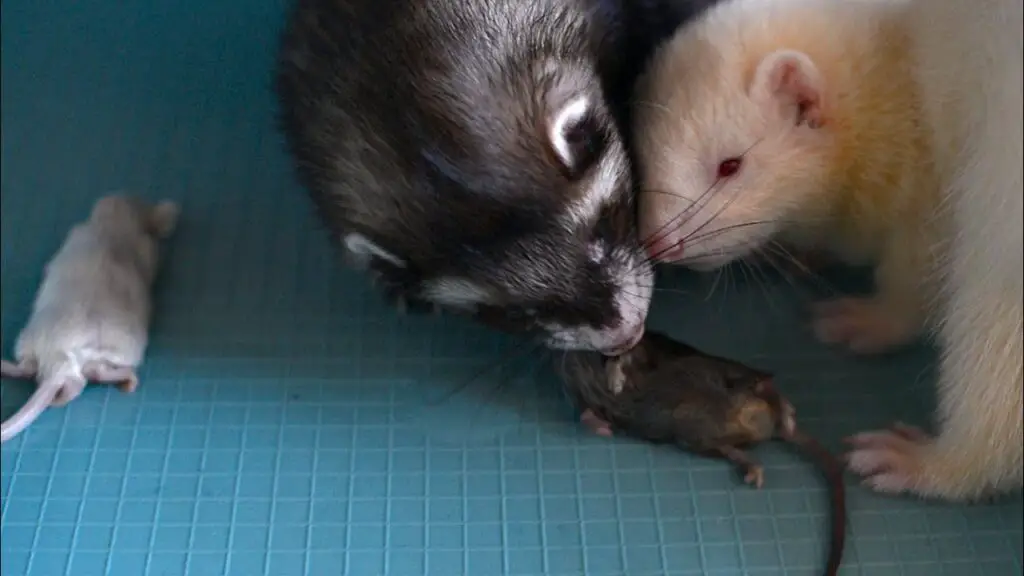
Do ferrets eat pet rats?
Ferrets will try to kill and eat rats. It’s not a good idea to even keep them in the same room together – the rats will know the ferrets are there and will be terrified. Same goes with rats and mice.
Ferrets, like their wild ancestors, are obligate carnivores. This means that their bodies have evolved to require a diet rich in animal-based protein and fat. In the wild, they primarily subsist on small mammals, birds, and insects. This carnivorous inclination is deeply ingrained in their genetic makeup.
While ferrets possess the ability to hunt pet rats, their behavior in a domestic setting is often influenced by their upbringing and environment. Ferrets raised in captivity and socialized with other pets, including rats, from a young age are less likely to view them as prey. Instead, they may develop amicable relationships, playing and coexisting peacefully.
If you have both ferrets and pet rats in your household, it’s essential to supervise their interactions carefully. Even if your ferret doesn’t view pet rats as prey, their play can be exuberant and sometimes rough. Ensure that both species are safe by providing separate enclosures and allowing supervised playtime.
Ferrets should receive a balanced and nutritionally complete diet that meets their specific dietary needs. Commercial ferret food is designed to provide the essential nutrients they require. Relying on pet rats as the primary food source for ferrets is not advisable, as it can lead to nutritional imbalances and other complications.
Do ferrets have high IQ?
I would rank ferrets to be just as intelligent as cats and dogs, maybe even a bit smarter, but their intelligence is also very different from cats and dogs. You can train a ferret similarly to how you would train a cat or a dog. But when left to their own devices – ferrets are naturally problem-solvers.
Ferrets are small, carnivorous mammals with relatively small brains compared to some other domesticated animals like dogs. However, their intelligence is by no means lacking. Ferrets possess a set of cognitive abilities and behaviors that make them adapt well to their environment.
One of the most prominent traits of ferrets is their insatiable curiosity and playfulness. They are constantly exploring their surroundings, investigating new objects, and engaging in activities that stimulate their minds. This natural curiosity is a sign of their intelligence, as it reflects their desire to learn and understand their environment.
Ferrets are known for their problem-solving abilities. They can figure out how to navigate obstacles, open latches, and even escape from enclosures if given the opportunity. This demonstrates a level of intelligence and adaptability that can surprise many ferret owners.
Ferrets are highly social animals and possess a keen understanding of social dynamics. They can recognize and remember the people and animals they interact with regularly. Their ability to communicate and cooperate with other ferrets and their human caregivers showcases their social intelligence.
Can ferrets and mice be friends?
People who feed ferrets with whole prey mostly use mice so they will definitely see them as a snack. Mice are small and adorable, but only to us. Ferrets will hunt them down probably the moment they smell them in the room. Just like with birds, even having a ferret in the same room can cause stress in mice.
The idea of ferrets and mice forming a friendship might seem counterintuitive, given the natural predator-prey relationship between these two species. However, the world of interspecies relationships in the animal kingdom is full of surprises. In this article, we’ll explore the intriguing question of whether ferrets and mice can be friends, examining the factors that influence their interactions and how to create a harmonious environment when these two animals coexist.
One of the most critical factors in determining whether ferrets and mice can coexist peacefully is early socialization. When ferrets are introduced to mice as young kits, they may develop a different perception of these rodents. Socialization helps them recognize mice as companions rather than prey.
Just as humans have varying personalities, so do ferrets and mice. Some ferrets may display a higher prey drive, while others may have a more relaxed temperament. Mice also vary in their social behaviors. The compatibility of these personalities can influence the potential for a harmonious interspecies relationship.
If you plan to introduce a ferret and a mouse, it is essential to do so under strict supervision. Even when socialized from a young age, there is no guarantee that every ferret will coexist peacefully with mice. Careful observation can help prevent any aggressive behavior.
Can ferrets eat chicken?
Ferrets love both cooked and raw meat, in particular rabbit, poultry and mice. Raw meat should be given fresh and don’t worry about the bones, ferrets can eat bones and they are a great source of calcium, marrowbone and minerals.
Ferrets, beloved for their playful and inquisitive nature, are obligate carnivores, which means their diet primarily consists of animal-based proteins. Given their carnivorous nature, it’s natural to wonder if ferrets can eat chicken. In this article, we will explore the dietary preferences of ferrets, the benefits and considerations of feeding them chicken, and how to incorporate this meat into their diet safely.
Ferrets have evolved as obligate carnivores, meaning their digestive system and nutritional requirements are optimized for a diet rich in animal protein and fat. Their bodies are not designed to process plant-based foods, and they lack the ability to digest carbohydrates effectively.
While chicken can be a healthy addition to a ferret’s diet, it should not be the sole source of nutrition. Commercial ferret food is specially formulated to meet their dietary needs, so it should remain the primary component of their diet. Chicken, along with other meat treats, can be offered as an occasional snack to provide variety and mental stimulation.
Are ferrets aggressive animals?
Ferrets are more docile than polecats but retain many of their natural and instinctive behaviours. They are intelligent, lively, playful and curious, and are not afraid of humans. They can become very friendly if handled frequently when young, although nursing jills can be aggressive and protective of their young.
Ferrets, with their curious and playful nature, are popular as pets, but their reputation for being aggressive animals often raises concerns among potential owners. In this article, we’ll delve into the topic of ferret aggression, exploring the factors that influence their behavior, the common misconceptions surrounding ferrets, and how to ensure a harmonious relationship with these furry companions.
Spaying and neutering are essential steps in managing ferret behavior. Unaltered ferrets may exhibit more dominant and territorial behaviors, which can occasionally be mistaken for aggression. Spaying and neutering can help reduce these behaviors and promote a calmer disposition.
True aggression in ferrets is rare but can be indicated by behaviors like unprovoked biting, hissing, or puffing up their fur. If you suspect your ferret is displaying aggressive behavior, consult a veterinarian or a ferret behavior specialist for guidance.
Ferrets are naturally inquisitive and social animals. They have a strong instinct to explore their surroundings, play, and engage with their human caregivers. This playful disposition is a significant part of their charm.
Does a ferret bite?
Hungry ferrets may bite to grab whatever might be food. And ferrets may bite when they resent being caged up for long hours; a bored ferret is usually a biting ferret. The solution is to play more often with your ferret — more handling leads to fewer tooth marks, not more.
Ferrets use their mouths for various forms of communication. Playful nipping or gently mouthing is common among ferrets and is not usually a sign of aggression. This behavior is akin to human playfulness and is a way for ferrets to engage with their environment and interact with you.
Ferrets may bite when they feel threatened, scared, or stressed. This type of biting is usually defensive, and ferrets may bite as a way to protect themselves. Understanding their body language and recognizing signs of fear or discomfort can help you avoid situations that might trigger this kind of biting.
Ferrets have a playful nature, and their idea of fun can sometimes involve more energetic play than humans are comfortable with. While rough play may involve nipping, it is generally not intended to cause harm. However, ferret owners should establish boundaries for acceptable play and discourage overly rough behavior.
Unspayed or unneutered ferrets may exhibit more dominant and territorial behaviors, which can include biting. Spaying and neutering can help reduce these tendencies, making for a calmer and more manageable pet.
Can ferrets cry?
It is not so much what the ferret does as it is a change in behavior. In other words, while ferrets stoically won’t show pain or distress by crying, they often signal pain with behavioral changes.
While ferrets communicate through a variety of vocalizations, they do not cry tears like humans do. In this article, we’ll explore the world of ferret vocalizations, their emotional expressions, and how to interpret and respond to their sounds.
Ferrets, like all animals, experience a range of emotions. They can feel joy, curiosity, fear, and even love. It’s crucial for ferret owners to become attuned to their pets’ cues, both vocal and non-vocal, to understand and respond to their needs effectively.
Unlike humans and some other animals, ferrets do not produce tears as a response to emotions or discomfort. Instead, they rely on vocalizations, body language, and scent marking to convey their feelings.
Are ferrets loyal pets?
A pet ferret can be one of the most loyal, cuddly, and loving pets available but could also be one of the most finicky. With a shorter lifespan of just 8 to 10 years, it is recommended that ferrets be spayed or neutered to prevent major health risks that would shorten their lives even more.
Ferrets are inherently social animals, and their affectionate nature is one of their defining traits. They form strong attachments to their human caregivers and often seek out interaction, cuddles, and play. Their desire for closeness and companionship can be seen as a form of loyalty.
Ferrets are known for forming social bonds not only with their human families but also with other ferrets. They thrive in the company of their own kind and often establish deep, lifelong friendships with their cage mates.
Ferrets’ playful and inquisitive nature makes them endearing and loyal pets. They enjoy exploring their environment and engaging in interactive play with their owners. This shared playtime fosters a sense of closeness and attachment.
Ferrets are creatures of habit and find comfort in routines. They seek security and stability, and their loyalty often manifests as a reliance on their human caregivers for love, care, and consistency.
Ferrets can recognize their owners through scent, voice, and appearance. They often respond positively to their owners’ presence and voice, which is a clear indicator of the bond and loyalty they share.
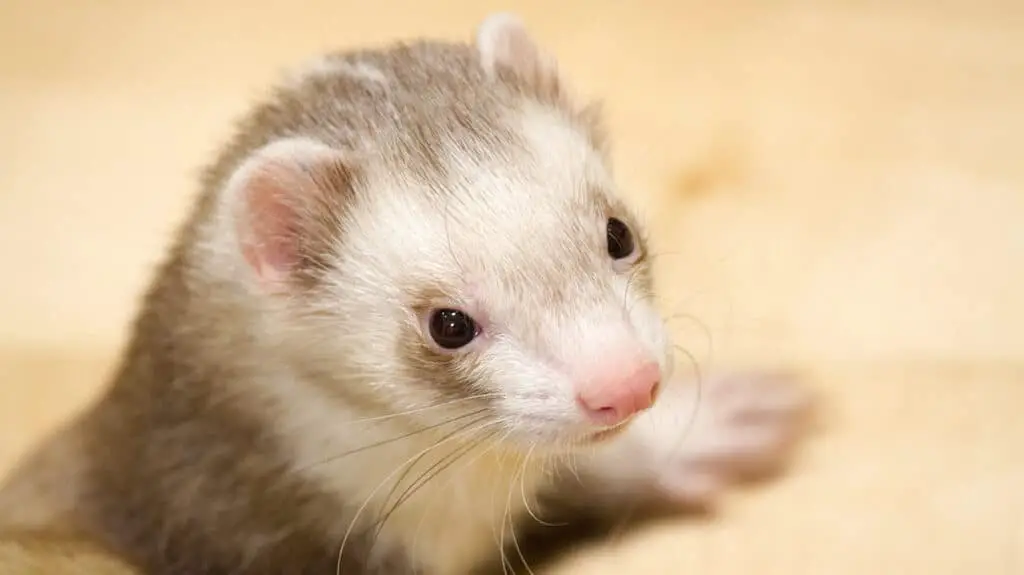
Conclusion
Ferrets are indeed obligate carnivores, with a strong ancestral history of hunting small mammals like mice. This instinct remains a part of their behavioral repertoire, and ferrets may occasionally chase and capture mice when given the opportunity. However, the modern practice of keeping ferrets as pets has shifted their dietary needs toward commercial ferret food, which provides a balanced and nutritionally complete diet. While ferrets may engage in hunting behaviors, it is not advisable to rely on ferrets mice as the primary food source for pet ferrets, as this can lead to nutritional imbalances. Responsible ferret owners should prioritize a well-rounded diet that meets their pets’ nutritional requirements, supplemented with occasional treats or opportunities for play that allow ferrets to exercise their hunting instincts in a controlled and supervised manner.
By striking this balance between their natural instincts and their dietary needs, ferret owners can ensure the health and happiness of these playful and curious carnivorous pets. In summary, the relationship between ferrets and mice is a fascinating reflection of the intersection between nature and nurture. While ferrets have retained their predatory instincts as carnivores, their domestication has altered their dietary needs and behavior. Ferrets may indeed catch and occasionally consume mice, but it is important for ferret owners to prioritize a nutritionally balanced diet to meet their pets’ specific needs. Commercial ferret food provides the necessary nutrients, reducing the reliance on hunting for sustenance.
Understanding this balance is key to responsible ferret ownership. By providing proper nutrition while occasionally allowing them to engage in their natural hunting behaviors, ferret owners can ensure the well-being and contentment of these captivating and playful animals. The question of whether ferrets eat mice may not have a definitive answer, but it highlights the intricate harmony between a pet’s instincts and their domesticated lifestyle. The fascination with whether ferrets eat mice extends beyond mere curiosity about their dietary habits. It speaks to the broader context of animal behavior, instincts, and the unique bonds formed between humans and their pets. Ferrets, with their inquisitive and playful nature, often exhibit behaviors that harken back to their wild ancestors.

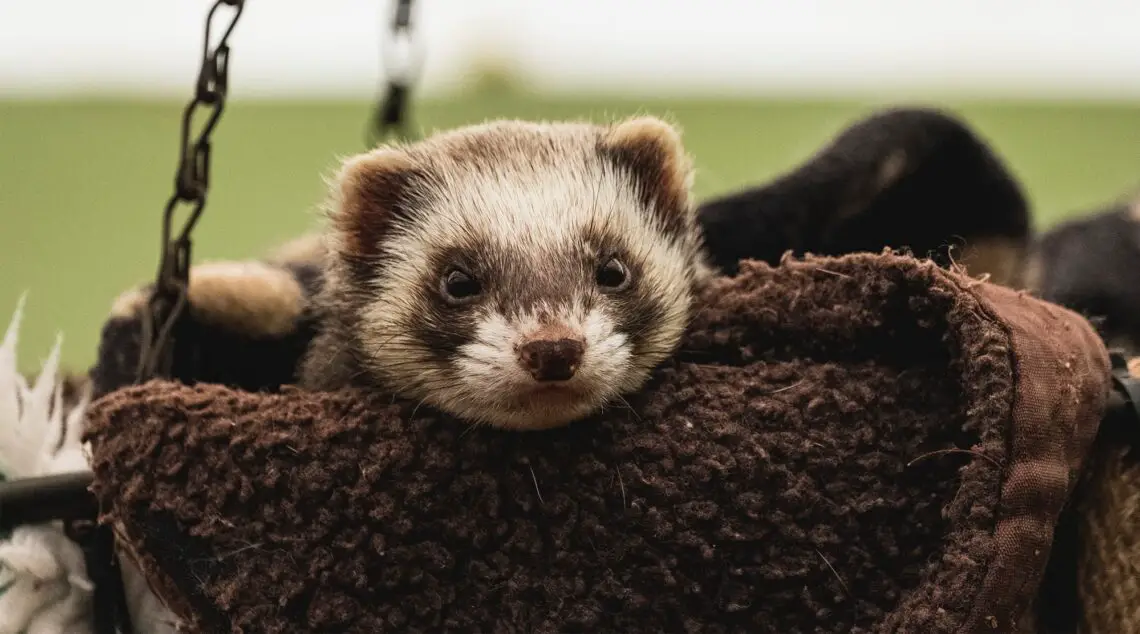
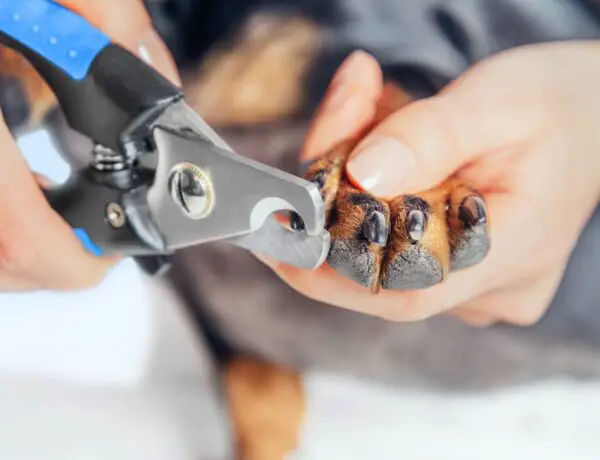
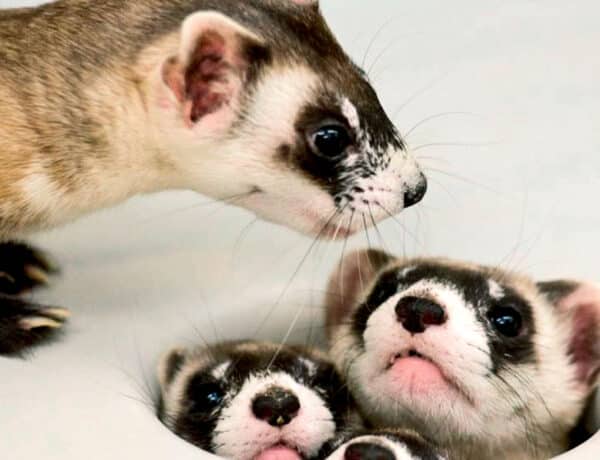

No Comments